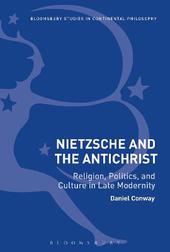
|
Nietzsche and The Antichrist: Religion, Politics, and Culture in Late Modernity
Paperback / softback
Main Details
Description
This collection both reflects and contributes to the recent surge of philosophical interest in The Antichrist and represents a major contribution to Nietzsche studies. Nietzsche regarded The Antichrist, along with Zarathustra, as his most important work. In it he outlined many epoch-defining ideas, including his dawning realisation of the 'death of God' and the inception of a new, post-moral epoch in Western history. He called the work 'a crisis without equal on earth, the most profound collision of conscience, a decision that was conjured up against everything that had been believed, demanded, hallowed'. One certainly need not share Nietzsche's estimation of his achievement in The Antichrist to conclude that there is something significant going on in this work. Indeed, even if Nietzsche overestimated its transformative power, it would be valuable nonetheless to have a clearer sense of why he thought so highly of this particular book, which is something of an outlier in his oeuvre. Until now, there has been no book that attempts to account with philosophical precision for the multiple themes addressed in this difficult and complex work.
Author Biography
Daniel Conway is Professor of Philosophy and Humanities at Texas A&M University, USA. He has lectured and published widely on topics pertaining to 19th-Century Philosophy, Social and Political Philosophy, Philosophy and Literature, Philosophy and Film, and Philosophy of Religion.
ReviewsThis is a most welcome volume that brings to bear much needed critical attention on one of Nietzsche's most important texts from his fertile late period. To illuminate this most provocative of texts Daniel Conway has assembled some of the finest commentators and scholars currently writing on Nietzsche today. The result is an incredibly rich and highly instructive set of well-researched and lucidly written essays that will engage readers across the humanities, including in philosophy, the history of ideas, literary studies, and German studies. * Keith Ansell-Pearson, Professor of Philosophy, University of Warwick, UK * Daniel W. Conway has assembled a treasure trove of stunningly brilliant essays, penned by the very best Nietzsche scholars worldwide. Altogether, the contributors lend Nietzsche's The Antichrist the attention it is woefully due but has heretofore somehow missed. Philosophers, political theorists, religious scholars, scientists, ethicists-readers of many sorts!-will immensely appreciate their encounters with these captivating, readable, and wise essays. * John Seery, George Irving Thompson Memorial Professor of Government and Professor of Politics, Pomona College, USA * Although Nietzsche's readers have given relatively little attention to The Antichrist, the publication of this collection demonstrates that the book Nietzsche described as his "revaluation of all values" more than merits philosophical scrutiny. Through detailed reconstruction and analysis of Nietzsche's insights and arguments, these essays, each written by a prominent Nietzsche scholar, deepen our understanding of familiar themes including: Nietzsche's critique of Christianity; his psychological reconstruction of the "Redeemer type"; his conception of specifically "priestly philosophy"; and his "naturalization" of the human. Daniel Conway's collection is a valuable addition to the philosophical study of Nietzsche's critique of modernity. -- Robert Gooding-Williams, Professor of Philosophy, Columbia University, USA
|